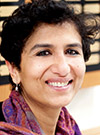New Center Brings Innovation to Science Teaching, Learning
A test can show whether a student knows the facts. But how can a professor be sure that the student understands the underlying thought processes or how to generalize knowledge and apply it to novel situations? What tools are available in a given discipline that can be used to quantify this type of learning?
To address these questions, the University of Pittsburgh Kenneth P. Dietrich School of Arts and Sciences has created the Discipline Based Science Education Research Center (dB-SERC), which will influence and strengthen teaching in the school’s nine natural science departments. Under the leadership of Founding Director Chandralekha Singh, professor of physics and astronomy, dB-SERC will work with faculty members to develop and implement ways of teaching courses that are grounded in research on teaching and learning.
address these questions, the University of Pittsburgh Kenneth P. Dietrich School of Arts and Sciences has created the Discipline Based Science Education Research Center (dB-SERC), which will influence and strengthen teaching in the school’s nine natural science departments. Under the leadership of Founding Director Chandralekha Singh, professor of physics and astronomy, dB-SERC will work with faculty members to develop and implement ways of teaching courses that are grounded in research on teaching and learning.
“We want to be able to measure what students should be able to do,” Singh said. “They should be able to solve problems, but they also need to develop skills as problem solvers and independent thinkers and be able to transfer their learning to other contexts. Deeper understanding can lead to better attitudes toward learning science, and the appreciation of learning can motivate them to learn more.”
“The ‘dB’ in dB-SERC actually has two meanings,” Singh explained. “The first is the literal acronym that stands for ‘discipline based,’ meaning that we are tailoring our activities to support evidence-based teaching and learning in the nine natural science departments. The second meaning of ‘dB’ refers to the ‘measurable gain’ that we hope to achieve. In science and engineering, dB is called ‘decibel’ and is a quantitative measure of gain or amplification. We want to provide tools that not only hold promise for improving student learning but also help faculty members assess the gains. We want to amplify the natural talent of our faculty members so that we can deliver more to students.”
Singh says the center plans to facilitate communities in which faculty will work together using existing research on science education to develop measurable goals and objectives and assessment tools. The center will also involve undergraduate and graduate teaching assistants by training them to be “Teacher-Researchers” who engage in carrying out assessments of learning in the courses they help instruct.
N. John Cooper, the Bettye J. and Ralph E. Bailey Dean of the Kenneth P. Dietrich School of Arts and Sciences, believes dB-SERC will make the University’s already strong science education programs even stronger.
“I’m very enthusiastic about the role that the Discipline Based Science Education Research Center can play in the University’s ongoing development of a culture of evidence-based teaching and grateful for the Provost’s vision and support in making this initiative a reality,” he said. “Professor Chandralekha Singh is committed to developing a Dietrich School-wide resource that is cored in physics education research but targeted on working with faculty from across the many disciplines of the sciences who teach courses at all levels of the undergraduate curriculum. Professor Singh’s specialization in physics education research positions her perfectly to serve as the inaugural director.”
For more than 15 years, Singh has researched strategies to teach physics more effectively. She has explored the cognitive issues involved in the teaching and learning of physics, investigated ways to inculcate students with effective problem-solving skills, and developed several research-based materials to teach physics effectively. She won the Tina & David Bellet Teaching Excellence Award in the Dietrich School of Arts and Sciences in 2000 and the Chancellor’s Distinguished Teaching Award in 2002. In 2011, she was elected a Fellow of the American Physical Society for contributions to the teaching and learning of quantum mechanics, and in 2012, Singh won the American Association of Physics Teachers’ Distinguished Service Citation for her contributions to physics education research.
The inaugural event for the center is a lecture—“Taking a Scientific Approach to Science Education”—by Nobel Laureate Carl Wieman, professor of physics and of the Graduate School of Education at Stanford University. The lecture, which is free and open to the public, will be held at 3 p.m. Jan. 30 in Pitt’s University Club, Ballroom B. Wieman will explain that science education hasn’t changed much for centuries, but research on how people learn has revealed more effective ways to teach and evaluate learning. The combination of this research with information technology, he says, is setting the stage for a new approach to teaching and learning.
Wieman received the Nobel Prize in Physics in 2001 for achieving a Bose-Einstein condensation in dilute gases of alkali atoms and for early fundamental studies of the properties of these condensates. Since then, he has focused on experimental approaches to the improvement of student understanding of physics at the undergraduate level. He has won many prestigious prizes in this area including the American Association of Physics Teachers Oersted Medal in 2007 and the Presidential Citation for Lifetime Achievement from the National Science Teachers Association in 2012.
Other Stories From This Issue
On the Freedom Road

Follow a group of Pitt students on the Returning to the Roots of Civil Rights bus tour, a nine-day, 2,300-mile journey crisscrossing five states.
Day 1: The Awakening
Day 2: Deep Impressions
Day 3: Music, Montgomery, and More
Day 4: Looking Back, Looking Forward
Day 5: Learning to Remember
Day 6: The Mountaintop
Day 7: Slavery and Beyond
Day 8: Lessons to Bring Home
Day 9: Final Lessons

